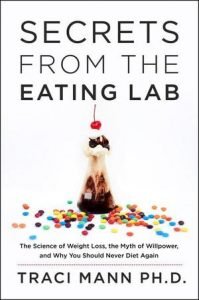 Today we will delve into Traci Mann’s excellent book, Secrets from the Eating Lab. The basic premise is that diets do not work, willpower is bullshit, and the true scientific way to find the best weight for you. Traci Mann is a professor of psychology at the Unniversity of Minnesota and has been researching health and eating in her Eating Lab for 20 years. Traci makes the content easily digestible and not only gives the skinny on weight loss but offers sound, realistic ways to a leaner and healthier you. (yeah, I know. Sorry about those puns. Just couldn’t resist.)?
Today we will delve into Traci Mann’s excellent book, Secrets from the Eating Lab. The basic premise is that diets do not work, willpower is bullshit, and the true scientific way to find the best weight for you. Traci Mann is a professor of psychology at the Unniversity of Minnesota and has been researching health and eating in her Eating Lab for 20 years. Traci makes the content easily digestible and not only gives the skinny on weight loss but offers sound, realistic ways to a leaner and healthier you. (yeah, I know. Sorry about those puns. Just couldn’t resist.)?
Diets do not work
Diets have two functions. One, to assist in weight loss. Two, to maintain this weight loss for an extended period of time (life?!!). Traci states that people lose weight on diets but not enough to satisfy themselves and the weight that they do lose, rarely do they keep it off. The weight loss industry is about a $60 billion dollar behemoth that offers false promises and is eager to sell you and I the next best thing that will finally work. 84% of dieters will always come back to ground zero to try and try again. Since Traci is a scientist, she has conducted the gold standard in research, randomized, controlled studies. The studies ranged from 2 to 10 years, and at the end, she found that participants were able to keep off a grand total of 2 pounds! What! 2 freakin’ pounds! Wait there’s more depression to follow. 40% weighed MORE than they did when they started! The controlled group gained only 1 pound. So all that blood, sweat and tears for the dieting group netted them a net of 3 pounds. There are flaws to the studies which the book gets into like people drop out, the weight is self-reported, etc. Taking these flaws into consideration, dieters will weigh more in five years after the diet ends than they did at the start. Here’s a startling statement: If the ‘cure’ for obesity is defined as a reduction to ideal weight and maintenance of that weight for 5 years, a person is more likely to recover form most forms of cancer than from obesity! Let that sink in for a moment. Okay let’s move on…
Why Diets do not work?
I love what Traci says form the outset: ‘If you have trouble keeping weight off, it is not a character flaw.’ Amen! Stop blaming yourself. The game is rigged and not in our favor. This harsh reality is encoded in our genes. It went from we eat to live to we live to eat. We are programmed to seek calories and plenty of it to make sure we survive. Add the constant temptation, in today’s world, and you have a one-two punch that is almost impossible to thwart. Scientists conclude that genes account for 70% of the variation in people’s weight. No all is not lost. You can have some influence, just not as much as you think you have. We all have a set-point. This is true not only for those who want to lose weight but those who want to gain weight. Here’s the point:?When our weight is within this range (set points), we don?t have to fight to maintain it. It?s easy. We can eat a little more or a little less, exercise a little more or a little less?and it won?t have much of a lasting impact. The hard part is trying to get out of that range, because to do so, you have to battle biology.?
Your brain, the pleasure and reward centers of the brain, are front and center when you are hungry which will undoubtably occur while dieting. You will notice food more often, seek it, and convince yourself how delicious that food looks and most likely tastes. The temptation is so great, the more you resist, the more intense it gets! Then the part of the brain that makes rational decisions and resists impulses is beaten down and regulated to coming up with the rational after the act of diet sabotage is committed. Then there are the hormones that are responsible for hunger and satiety. When you diet, these hormonal changes, urge you to eat and eat a lot. Perfectly normal human experience. We are hard-wired that way and now I hope you can see how dieting as the industry put it, is an act in futility. It doesn’t & won’t work.?
Diets Make You Dumb
Dieters cannot recall many words and sentences as non-dieters. Their focus is limited and sporadic. When the part of the brain responsible for executive function, rational decision making and impulse control, is impaired, it interferes with your ability to plan, make decisions, and solve problems. Well what do you know. These are exactly the aspects of the brain needed for self-control, i.e, dieting. Traci wants to be clear: She is not saying dieters are not smart, but that dieting causes people to be less smart than they are. In addition to lower cognitive functions, diets are stressful! This is where the hormone cortisol (the fight/flight hormone) takes the spotlight. Your body doesn’t understand that you are dieting so it just won’t chill with the normal biological reactions. Your body assess that it isn’t?receiving?the adequate calories for survival and cortisol?diverts the energy from bodily functions that aren’t?useful for flight or fight response. What is temporarily shut off? Immune function, reproduction, growth and energy storage. Result: more?susceptible?to infections, bone density decrease, blood?pressure increase, blood vessels get damaged, insulin resistance and cell damage.
Diets also suck the life out of you! You have a lower sense of self. Depression and anger are common consequences. Guilt becomes a nagging feeling whenever you are faced with a decision about thinking and eating food. Then finally shame takes residence and this all has leads to more stress.
All this because you want to look good naked?!! Is it worth it. Traci makes a compelling argument NOT to diet!
Obesity is NOT a Death Sentence
In today’s society, obesity is frowned upon. People who ‘look’ obese, are?discriminated?against and are viewed as lazy, impulsive, sickly, human beings. Dr. Chip in his controversial book, The Obesity Paradox, has researched obesity and has found that fat isn’t always the devil but low fitness level is more important for long term mortality. In the Secrets from the Eating Lab, Traci cites a biostatistician, Katherine Flegel, who compiled hundreds of studies with over a million participants and concluded that overweight people had a slightly lower risk of death than normal-weight people! Put that in your?pipe and smoke it (no, don’t that! That will definitely kill you!). Here’s a fact: there have been no studies to show that obesity causes health problems and/or health benefits. Showing that obesity is the cause of health problem (or benefit) is a difficult scientific problem. A thin person who purposely gains weight is biologically different from a person who has been obese for most of their life.?
This is how Traci summarizes the fear of obesity:?I hope you?re not still under the impression that you have to diet or else obesity will kill you. If you exercise, eat nutritiously, avoid weight cycling, and get good quality medical care, you don?t need to worry about obesity shortening your life.?
Lessons from a Lean Pig
Traci Mann gives 12-15 realistic strategies to help you towards the lower?ideal weight range or set point range. Here are just a few:
- ENCOUNTER LESS TEMPTATION BY CREATING OBSTACLES:??Where do you encounter the temptations? Prepare your own meals. Use a smaller plate. Create tiny obstacles like place tempting food in a place that is a bit laborious to get at (basement, attic, etc). When in public, make sure you have a drink in one hand (hopefully water) and a healthy food in the other and then put some distance from you and that cake.
- MAKE HEALTHY FOODS MORE ACCESSIBLE AND NOTICEABLE:? I’m sure you’ve heard, ‘Out of sight. Out mind’. Yes that works as a tip for #1 but also the flip side to that, ‘In Sight. On the Mind’. Keep those fruits easily at hand and always in your line of sight. Sometimes keeping healthy lifestyle magazines around the house, in the kitchen, in the bathroom can reinforce healthy habits. Once you find out what consistently prevents you from eating healthy foods, come up with creative ways to knock down those barriers.
- BE ALONE WITH A VEGETABLE:? Start every meal with a vegetable like a salad. Studies have shown eating a salad before your meal can satisfy some hunger, preventing you from over-eating and snacking. Better yet. Eat the salad then prepare your meal. At a?restaurant, order a salad and?ask the server to hold off the main course until you are finished with your salad. Again create a small barrier. Tell the server not to bring you the main dish until you ask for it.?
***Lesson: If it’s not there. You won’t eat it.***
Conclusion:
The Secrets from the Eating Lab by Traci Mann is one of those life and mental altering books. I’ve been a fitness professional for over 20 years and the nutritional education I’ve?received?has always focused?on energy balance, energy in vs. energy out. You know, if you wanna lose weight you have to eat less and exercise more. What a load of crap! Ok that is a small part of the complex equation. Lip service was paid also towards behavior modification but a very superficial understanding. Just enough so you can pass an exam or get another certification. So I made it my business for self-education and this book really lays out the problem with today’s diet mentality. The science is there but also remember that science is always self-correcting meaning that the research in this book isn’t the definite research on weight loss. It is a building block to the next but rest assure that if you want a very down-to-earth explanation on why diets fail and implement practical strategies to strike a balance between biology and desire (looking and feeling good naked), then I would highly recommend Traci Mann’s, Secrets from the Eating Lab!

